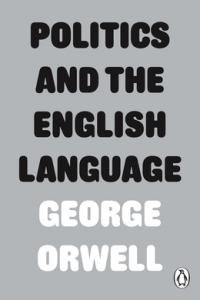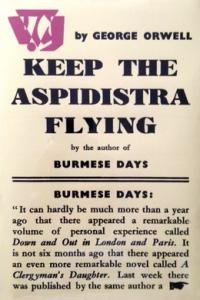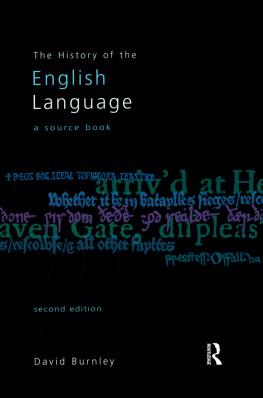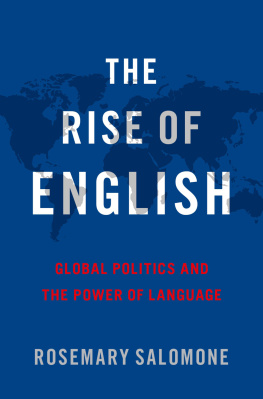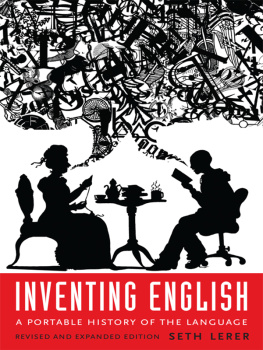Dzhordzh Oruell - Politics and the English Language
Here you can read online Dzhordzh Oruell - Politics and the English Language full text of the book (entire story) in english for free. Download pdf and epub, get meaning, cover and reviews about this ebook. year: 2015, publisher: epubBooks Classics, genre: Non-fiction. Description of the work, (preface) as well as reviews are available. Best literature library LitArk.com created for fans of good reading and offers a wide selection of genres:
Romance novel
Science fiction
Adventure
Detective
Science
History
Home and family
Prose
Art
Politics
Computer
Non-fiction
Religion
Business
Children
Humor
Choose a favorite category and find really read worthwhile books. Enjoy immersion in the world of imagination, feel the emotions of the characters or learn something new for yourself, make an fascinating discovery.
- Book:Politics and the English Language
- Author:
- Publisher:epubBooks Classics
- Genre:
- Year:2015
- Rating:3 / 5
- Favourites:Add to favourites
- Your mark:
- 60
- 1
- 2
- 3
- 4
- 5
Politics and the English Language: summary, description and annotation
We offer to read an annotation, description, summary or preface (depends on what the author of the book "Politics and the English Language" wrote himself). If you haven't found the necessary information about the book — write in the comments, we will try to find it.
Politics and the English Language — read online for free the complete book (whole text) full work
Below is the text of the book, divided by pages. System saving the place of the last page read, allows you to conveniently read the book "Politics and the English Language" online for free, without having to search again every time where you left off. Put a bookmark, and you can go to the page where you finished reading at any time.
Font size:
Interval:
Bookmark:
Politics and the English Language
George Orwell
Most people who bother with the matter at all would admit that the English language is in a bad way, but it is generally assumed that we cannot by conscious action do anything about it. Our civilization is decadent, and our languageso the argument runsmust inevitably share in the general collapse. It follows that any struggle against the abuse of language is a sentimental archaism, like preferring candles to electric light or hansom cabs to aeroplanes. Underneath this lies the halfconscious belief that language is a natural growth and not an instrument which we shape for our own purposes.
Now, it is clear that the decline of a language must ultimately have political and economic causes: it is not due simply to the bad influence of this or that individual writer. But an effect can become a cause, reinforcing the original cause and producing the same effect in an intensified form, and so on indefinitely. A man may take to drink because he feels himself to be a failure, and then fail all the more completely because he drinks. It is rather the same thing that is happening to the English language. It becomes ugly and inaccurate because our thoughts are foolish, but the slovenliness of our language makes it easier for us to have foolish thoughts. The point is that the process is reversible. Modern English, especially written English, is full of bad habits which spread by imitation and which can be avoided if one is willing to take the necessary trouble. If one gets rid of these habits one can think more clearly, and to think clearly is a necessary first step towards political regeneration: so that the fight against bad English is not frivolous and is not the exclusive concern of professional writers. I will come back to this presently, and I hope that by that time the meaning of what I have said here will have become clearer. Meanwhile, here are five specimens of the English language as it is now habitually written.
These five passages have not been picked out because they are especially badI could have quoted far worse if I had chosenbut because they illustrate various of the mental vices from which we now suffer. They are a little below the average, but are fairly representative samples. I number them so that I can refer back to them when necessary:
(1) I am not, indeed, sure whether it is not true to say that the Milton who once seemed not unlike a seventeenthcentury Shelley had not become, out of an experience ever more bitter in each year, more alien (sic) to the founder of that Jesuit sect which nothing could induce him to tolerate.
PROFESSOR HAROLD LASKI (Essay in Freedom of Expression)
(2) Above all, we cannot play ducks and drakes with a native battery of idioms which prescribes such egregious collocations of vocables as the Basic put up with or tolerate or put at a loss or bewilder.
PROFESSOR LANCELOT HOGBEN (Interglossa)
(3) On the one side we have the free personality; by definition it is not neurotic, for it has neither conflict nor dream. Its desires, such as they are, are transparent, for they are just what institutional approval keeps in the forefront of consciousness; another institutional pattern would alter their number and intensity; there is little in them that is natural, irreducible, or culturally dangerous. But on the other side, the social bond itself is nothing but the mutual reflection of these selfsecure integrities. Recall the definition of love. Is not this the very picture of a small academic? Where is there a place in this hall of mirrors for either personality or fraternity?
ESSAY ON PSYCHOLOGY in Politics (New York)
(4) All the "best people" from the gentlemen's clubs, and all the frantic fascist captains, united in common hatred of Socialism and bestial horror of the rising tide of the mass revolutionary movement, have turned to acts of provocation, to foul incendiarism, to medieval legends of poisoned wells, to legalize their own destruction of proletarian organizations, and rouse the agitated pettybourgeoisie to chauvinistic fervor on behalf of the fight against the revolutionary way out of the crisis.
COMMUNIST PAMPHLET
(5) If a new spirit is to be infused into this old country, there is one thorny and contentious reform which must be tackled, and that is the humanization and galvanization of the B.B.C. Timidity here will bespeak canker and atrophy of the soul. The heart of Britain may lee sound and of strong beat, for instance, but the British lion's roar at present is like that of Bottom in Shakespeare's Midsummer Night's Dreamas gentle as any sucking dove. A virile new Britain cannot continue indefinitely to be traduced in the eyes, or rather ears, of the world by the effete languors of Langham Place, brazenly masquerading as "standard English." When the Voice of Britain is heard at nine o'clock, better far and infinitely less ludicrous to hear aitches honestly dropped than the present priggish, inflated, inhibited, schoolma'amish arch braying of blameless bashful mewing maidens.
LETTER IN Tribune
Each of these passages has faults of its own, but quite apart from avoidable ugliness, two qualities are common to all of them. The first is staleness of imagery; the other is lack of precision. The writer either has a meaning and cannot express it, or he inadvertently says something else, or he is almost indifferent as to whether his words mean anything or not. This mixture of vagueness and sheer incompetence is the most marked characteristic of modern English prose, and especially of any kind of political writing. As soon as certain topics are raised, the concrete melts into the abstract and no one seems able to think of turns of speech that are not hackneyed: prose consists less and less of words chosen for the sake of their meaning, and more and more of phrases tacked together like the sections of a prefabricated henhouse. I list below, with notes and examples, various of the tricks by means of which the work of proseconstruction is habitually dodged:
Dying metaphors. A newlyinvented metaphor assists thought by evoking a visual image, while on the other hand a metaphor which is technically "dead" (e.g., iron resolution) has in effect reverted to being an ordinary word and can generally be used without loss of vividness. But in between these two classes there is a huge dump of wornout metaphors which have lost all evocative power and are merely used because they save people the trouble of inventing phrases for themselves. Examples are: Ring the changes on, take up the cudgels for, toe the line, ride roughshod over, stand shoulder to shoulder with, play into the hands of, an axe to grind, grist to the mill, fishing in troubled waters, on the order of the day, Achilles' heel, swan song, hotbed. Many of these are used without knowledge of their meaning (what is a "rift," for instance?), and incompatible metaphors are frequently mixed, a sure sign that the writer is not interested in what he is saying. Some metaphors now current have been twisted out of their original meaning without those who use them even being aware of the fact. For example, toe the line is sometimes written tow the line. Another example is the hammer and the anvil, now always used with the implication that the anvil gets the worst of it. In real life it is always the anvil that breaks the hammer, never the other way about: a writer who stopped to think what he was saying would be aware of this, and would avoid perverting the original phrase.
Operators, or verbal false limbs. These save the trouble of picking out appropriate verbs and nouns, and at the same time pad each sentence with extra syllables which give it an appearance of symmetry. Characteristic phrases are: render inoperative, militate against, prove unacceptable, make contact with, be subjected to, give rise to, give grounds for, having the effect of, play a leading part (role) in, make itself felt, take effect, exhibit a tendency to, serve the purpose of, etc., etc. The keynote is the elimination of simple verbs. Instead of being a single word, such as break, stop, spoil, mend, kill, a verb becomes a phrase, made up of a noun or adjective tacked on to some generalpurposes verb as prove, serve, form, play, render. In addition, the passive voice is wherever possible used in preference to the active, and noun constructions are used instead of gerunds (by examination of instead of by examining). The range of verbs is further cut down by means of the 'ize' and 'de' formations, and banal statements are given an appearance of profundity by means of the not 'un' formation. Simple conjunctions and prepositions are replaced by such phrases as with respect to, having regard to, the fact that, by dint of, in view of, in the interests of, on the hypothesis that; and the ends of sentences are saved from anticlimax by such resounding commonplaces as greatly to be desired, cannot be left out of account, a development to be expected in the near future, deserving of serious consideration, brought to a satisfactory conclusion, and so on and so forth.
Font size:
Interval:
Bookmark:
Similar books «Politics and the English Language»
Look at similar books to Politics and the English Language. We have selected literature similar in name and meaning in the hope of providing readers with more options to find new, interesting, not yet read works.
Discussion, reviews of the book Politics and the English Language and just readers' own opinions. Leave your comments, write what you think about the work, its meaning or the main characters. Specify what exactly you liked and what you didn't like, and why you think so.

